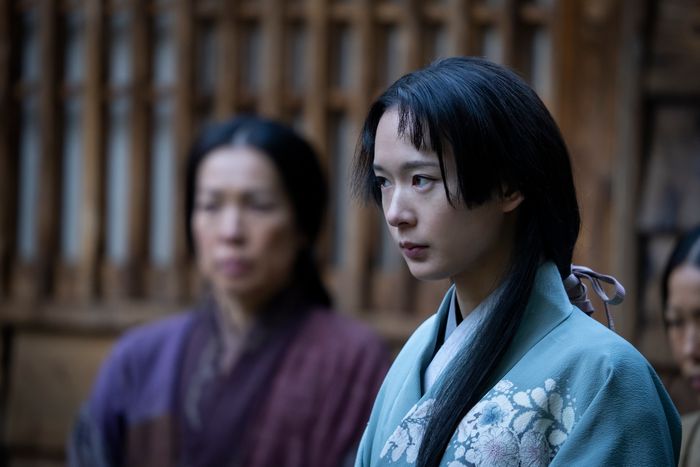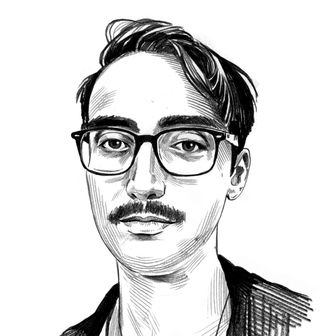
It’s important to Moeka Hoshi that she’s translated correctly — this is her first U.S. interview, after all, and translation happens to be a central theme of her breakout project. The FX historical drama Shōgun follows, among others, an English sailor named John Blackthorne, a.k.a. the Anjin (Cosmo Jarvis), who becomes a pawn in a power struggle between rival Regents ruling Japan. One of the show’s biggest pleasures is watching the Anjin slowly learn the language with the help of his love interest and translator Toda Mariko (Anna Sawai), who often slyly tweaks messages for both her own purposes and to avoid unnecessary conflict. Not being understood is a reasonable fear, whether you’re a shipwrecked navigator in 1600 Osaka or a Japanese actress making her American debut.
In Shōgun, Hoshi plays Usami Fuji, a woman ordered by Lord Toranaga (Hiroyuki Sanada) to be the Anjin’s consort. Bound to the rigid honor codes and unwritten rules she’s adhered to her whole life, Fuji compartmentalizes her turmoil behind an internal “eightfold fence” — especially after losing both her son and her husband when the latter commits seppuku in the pilot after disrespecting the Council of Regents. That struggle to suppress makes her one of Shōgun’s most complex supporting characters.
“Women in this era in Japan weren’t allowed to say whatever they wanted,” Hoshi says through a translator. “At the same time, though, that happens in real life right now, too, so it’s not just a time thing. But I also think it’s very human-being-like to keep things to yourself.”
This is your first time working on an American series, and on a major production like this in general. What has that experience been like?
Before starting, I didn’t know what to expect. During the cast meet-and-greet on Zoom, there were so many people, and everybody was international. Sanada-san was in Berlin working at that time. I was a little nervous. But when I reached out to the showrunner Justin Marks to better understand Fuji’s background, he told me I was the first person to reach out about characters, and that his door was always open. It allowed me to fully trust the production process.
In terms of my experience shooting … there were so many people involved. Even our crew list felt as thick as a phone book. Everything was large in scale. The camera and the crane, for example, were so large, and something I hadn’t seen in Japan. The scale, and obviously the budget, was quite big. It was such a special experience, and it made me crave more in the future.
This story takes place in 1600, so the Japan onscreen is nothing like the Japan where you’ve spent your life. What was it like visiting this past era and seeing it come to life over in British Columbia?
During the initial meet-and-greet that I mentioned, Sanada-san said the show would value authenticity. I’d never done Japanese period films before. I’d assume Japanese period films made in Japan are authentic, but I didn’t even have that experience, so I didn’t know what to expect in Vancouver. But knowing Sanada-san was checking every detail gave me a great deal of assurance. Once I was there, the Japanese crew, who have a great deal of experience, were all impressed with the scale, and how much care was being taken for the sake of authenticity. So while I may not have that kind of knowledge myself, thanks to the sets, I could live like a woman who lived in that time.
So much of this show is about translation, and we’re even using a translator right now. Did communication ever pose a challenge on set, either with Cosmo Jarvis or any directors or crew?
I love Cosmo, but he had a shy personality, so we didn’t talk that much off-set. But while we were acting in front of the camera, we felt the connection, and that was enough. Even without many words, it felt clear that there was a mutual respect. When we saw each other again at the Japan premiere, he was no longer in character, and we were able to communicate.
In terms of communication with directors and Justin during the shoot, I always thought it’d be best if we could communicate directly without interpreters. I was practicing English. With time, I became more comfortable with my listening skills, but I still wasn’t confident in understanding everything, so I had interpreters translate to make sure. My listening is pretty good now — I can understand about 70 to 80 percent of what you’re saying. But I’m not as confident with my speaking skills. Toward the end, while shooting episode ten, I was able to communicate directly with Fred [director Frederick E. O. Toye]. He’d give me a direction, and I was able to respond with simple English. I’m still learning.
Getting into Fuji’s specific motivations, we’ve seen her slowly grow to respect John Blackthorne. What’s been going on in her head the last few episodes? Is she still privately grieving behind the wall she’s put up?
First of all, serving Blackthorne is a limited-time commitment. [Laughs.] That’s in her head: Being his consort is a duty that needs to be fulfilled. Most people refer to him as a barbarian, so Fuji certainly has her prejudices at the beginning. But as she is forced to get to know him, her prejudice starts to fade. Even for us in today’s world, getting rid of prejudice is not easy. But Fuji manages to see him as a human, and see that he is not a bad or vulgar person, so her value judgment changes. Granted, it’s through Mariko at the beginning, but gradually she starts to connect and grow mutual respect with Blackthorne.
I see Fuji as a flexible person. Or, rather, she becomes as such. She’s also rooting for Mariko and Blackthorne. Fuji is not required to pillow with him, and therefore there is a certain distance from which she is growing to respect him.
We don’t hear Fuji and Mariko speak openly about Mariko’s relationship with Anjin, but it seems like Fuji knows what’s going on between them and even supports it to a certain degree.
Fuji knows Buntaro, Mariko’s husband, has done horrible things to Mariko. So she’s kind of hoping something will happen so that Anjin and Mariko can be together.
From a performance standpoint, how do you approach playing a character who is so defined by what she keeps inside?
Actually, that’s an interesting question. When I look at myself onscreen, I’m like, “Whoa, I look emotional. Emotions are on my face already.” So I don’t think I did a very good job keeping to myself. [Laughs.] I did ask Justin about not just the script, but what Fuji would have thought during filming. But that’s not in the script, so I tried to keep her personality buried as much as possible.
We learn that Fuji doesn’t know the truth about how her father died, and thinks he died honorably. What would that do to her if she found out?
If she found out now, it would definitely be a shock. But Fuji would cherish and appreciate the fact that they’re trying to protect her. She’d think, more so, I have to cherish the people around me.
Is there a potential path through Fuji’s grief at the end of this story? What do you imagine for her?
It’s tricky not to spoil. When Fuji is first asked to become Anjin’s consort, she expresses a wish to become a nun instead. If that is still with her, it could be one possible path. Regardless, through Mariko and other people Fuji encounters, I hope she can find purpose in life.
This interview has been edited and condensed for clarity.


